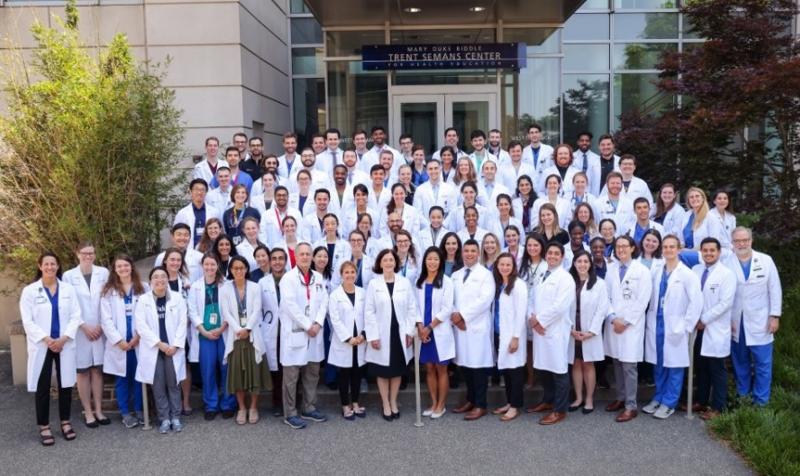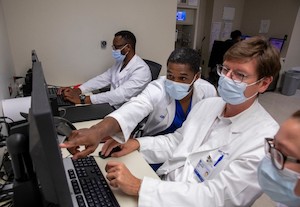
The 2022-2023 recruiting season is underway for the Department of Medicine’s (DOM) Internal Medicine (IM) Residency Program, a major pipeline for Duke faculty and future leaders in academic medicine.
Nearly half of the Duke DOM faculty has done some part of their training here, and there is a proud tradition of training clinicians, researchers, and educators that are national thought leaders. “We emphasize this message to our invited applicants, noting that we think of them as not just people who will spend three years training to become internists in our program but that they are potential future faculty who can help shape, change and grow the mission of Duke Medicine,” says IM Program Director, Aimee Zaas, MD, MHS.
IM Residency Interviewers Needed
Active support of our training programs this year is more important than ever to building trust, and lasting connections, with our current and future residents. All interviews are being held virtually which will allow for many faculty members to participate. Deadline to sign up is October 28, 2022
See this PDF with answers to common questions about the Internal Medicine Residency Program and visit the IM Residency website to learn about current interns and the program
Supporting Diversity in Our Recruitment Efforts
In laying that ground work for the future, it is essential to bring together a diverse and inclusive community that appreciates our differences and recognizes that diversity is critical to success. Through dedicated work with the DOM and its Minority Recruitment and Retention Committee (MRRC), Duke Graduate Medical Education, and the School of Medicine Office of Diversity and Inclusion, the IM recruitment process has been strengthened to better support diversity in recruitment, a necessary step to achieving the goals of true diversity, equity, inclusion and anti-racism set by the IM program, the DOM and Duke Health.
Over the last year, efforts have further stepped up with the inclusion of a core underrepresented in Medicine (URiM) recruitment team, re-training in holistic review, and the additional of Minority Recruitment and Retention (MRRC) members to the IM ranking committee.
Recruiting efforts have resulted in an uptick of matches among historically excluded groups. With 46 interns matched each year, the percentage of minorities among those matches climbed from 13% in 2020-21 to 24% in 2021-22.
The hope is that these measures will continue to help grow the presence of underrepresented minorities among the ranks of Duke residents, the medicine faculty, and ultimately, future leaders in academic medicine.
"Diversity is one of our institutional core values,” says David Ortiz-Melo, MD, MRRC, vice chair. “It is well known that a diverse and inclusive workplace renders better results and sense of wellbeing. Recruiting URMs applicants is a way not only to honor our core values, but also to help us take better care of our growing diverse community, while addressing the health care disparities that we are currently facing.”
“The numbers are important and necessary, but the focus is really about changing the environment, the long-term retention and support of a workforce that represents diversity and all of its forms,” Zaas says. “Bringing people here is a tactic, but if you bring people here and you change nothing else, then you're not actually accomplishing the mission, which is an inclusive, equitable, diverse workforce and community at Duke where everyone has the chance to thrive.”
As Duke joins the ranks of more medical schools in the move toward holistic assessment of applicants, IM recruiters believe this is one way to help change the environment and further strengthen the success and mission of the Duke’s IM Residency program. Holistic assessment has shown benefits in the reduction of unintended biases in admissions, grading, and other measures.
The IM Residency program follows three major themes throughout residency, pillars that are critical to an individual’s success not only in residency, but for the lifetime of their careers. The first is support of trainees in their clinical, professional and personal development. Rotations, mentoring and academic support, programming and well-being/community building offerings are geared toward ensuring that Duke’s residents are well supported in each of these domains as they grow from newly-minted MDs to professionals.

The second pillar, as Zaas likes to say, is an emphasis on “finding your And,” meaning that while residents will absolutely learn to be outstanding clinicians during their time at Duke, they will also engage deeply in the other aspects that will define them as future professionals. “Ands” include research, global health, master clinician, educator, advocate, administrator, data scientist and more. Duke’s comprehensive mentoring, advising and coaching programs are designed to help residents define and pursue the many possible “ands” during their time at Duke, she adds.
The third pillar is diversity of experience, background and future plans, all critical underpinnings to achieving the IM program’s missions. The DOM and medical center depend on recruiting, supporting and retaining residents who represent the depth and breadth of the community that Duke serves.
“In my opinion, diversity efforts start here, with actively recruiting a diverse pool of residents and fellows,” Ortiz-Melo adds. “If we want to diversify our faculty, our clinics, our wards, our research labs and our leadership, then we need to work hard to recruit and successfully retain applicants from different backgrounds. For these efforts to be successful, we need everyone’s help during recruitment season and everyone’s permanent commitment to foster a more diverse and inclusive Department of Medicine."